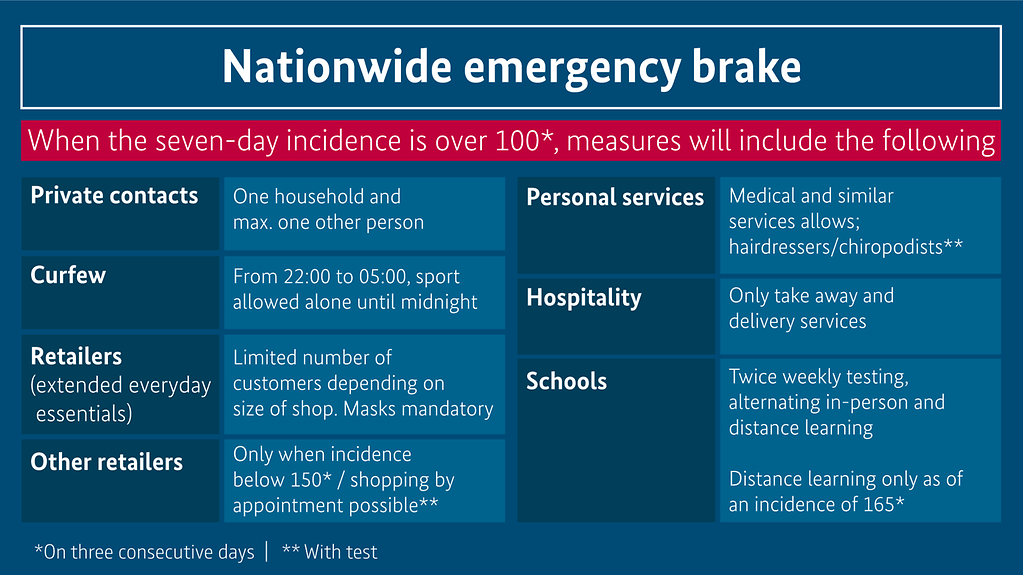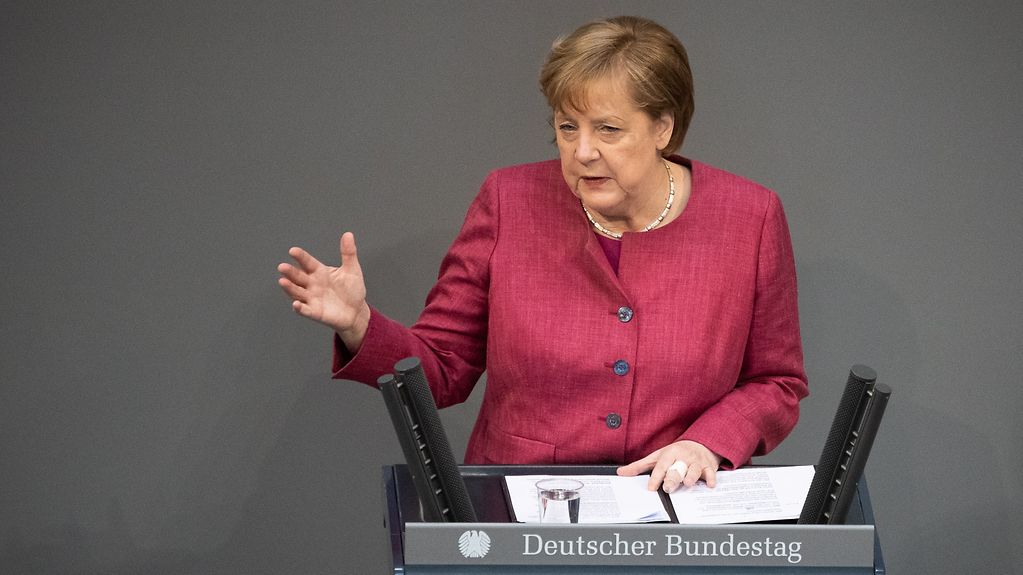Infection Protection Act in the German Bundestag
In future if the seven-day incidence in a district or town exceeds 100, additional measures, standardised at national level, are to be triggered to stem the rise in infections. The German Bundestag has voted to amend the Infection Protection Act. The amended version is to help stem the third wave of the pandemic.
6 min reading time

The German Bundestag passed the amendment to the Infection Protection Act today
Photo: picture alliance/dpa/Kay Nietfeld
The German Bundestag today passed important amendments to the Infection Protection Act. The central changes is that in future, if the seven-day incidence in a district or town exceeds 100 on three consecutive days, additional measures will come into effect two days later. These measures apply nationwide and have now been incorporated in the Act.
The incidence of 100 is exceeded when more than 100 new cases of infections with SARS-CoV-2 per 100,000 inhabitants are recorded over a seven-day period.
“The situation is serious, very serious,” stressed Federal Minister of Health Jens Spahn in the German Bundestag. We can see this by taking a look at the capacity of intensive care units, which he described as “the hardest currency in this pandemic”. Vaccination and testing provide prospects, but are not in themselves enough to contain the third wave. There is one effective, tried and tested way of doing that – “reducing contacts and thus reducing transmission of the infection”.
It is not a permanent state of affairs
“What we need now is clarity and rigour,” underscored Federal Minister of Finance Olaf Scholz during the parliamentary debate. The amendment to the Infection Protection Act stipulates that something has to happen when an incidence of over 100 is recorded – “everywhere in Germany”. The new provisions are intended to make the necessary measures easier to understand and to generate more support for these measures. Olaf Scholz made it clear that the aim is to overcome the pandemic and that this is not to be a “permanent state of affairs”.
A large number of measures to reduce contacts
The nationwide emergency brake now provides for a large number of measures in order to significantly reduce contacts and brake the spread of the virus when case numbers increase beyond a certain level. These measures are set out in the new Article 28b of the Infection Protection Act (Infektionsschutzgesetz). Many citizens are already familiar with most instruments, which have been agreed on by the Heads of Government of the Länder and the Federal Chancellor to combat the pandemic.
- Contact restrictions for private gatherings inside and outside: Reducing private and professional contacts is the most effective way of braking the number of new cases. But nobody should be lonely, so it will still be possible for the members of a household to meet up with one other person from outside the household even when the incidence exceeds 100. Gatherings with more people will not be permitted.
- Shop opening: Even when incidences are high, people can be assured that there will be a reliable supply of food, everyday essentials and existentially important services. Food stores including direct sales may open, along with beverage retailers, health food stores, specialised baby needs stores, pharmacies, medical equipment and supplies stores, drug stores, opticians, hearing testing and hearing aid specialists, petrol stations, newspaper sellers, bookstores, flower shops, pet supplies stores, animal food markets, garden centres and wholesalers. In all cases, these businesses may only open if they have an appropriate hygiene concept, and face masks will be mandatory.
Where the incidence is under 150 all other shops will be allowed to offer customers appointments to shop, provided they supply evidence that they have tested negative. In the services sector, everything that is not specifically prohibited may remain open, including bicycle and car workshops, banks, post offices etc. - Personal services – only permissible in exceptional circumstances: Personal services are only permitted for medical or nursing purposes, as therapy or as pastoral care. Hairdressers and pedicurists are an exception, but clients must provide evidence that they have tested negative for COVID-19 that day, and of course masks are mandatory. No other personal services are to be permitted.
- Limited leisure and sporting activities: As of an incidence of over 100, hotels, the hospitality sector, leisure facilities and cultural facilities are to close, with the exception of zoological and botanic gardens. Visitors will be required to provide evidence that they have tested negative. Professional athletes and elite athletes competing for national or Länder teams may continue to train and participate in competitions – still without an audience and in compliance with protective and hygiene concepts. Everyone else can engage in sporting activities, but only alone, or with one other person, or with members of their own household. Children up to the age of 14, however will be allowed to engage in non-contact sport outside with up to five other children.
- Curfews: Between 22:00 (10pm) and 5:00 (5am) people will only be permitted to leave their homes if they have a good reason, such as going to or from work, seeking medical assistance or taking a dog for a walk. Until midnight it will be permissible to go for a walk or a jog alone. Curfews are only one of many instruments. They help limit mobility. And limiting mobility is a way of reducing the number of new cases.
- No in-person teaching when the incidence exceeds 165: Infections do not stop at the school gate. Because of the dynamic situation, it is right to have a nationwide regulation when the epidemiological situation makes it necessary. If the incidence exceeds 165, in-person teaching in schools and regular care in nurseries and children’s daycare will be prohibited. Possible exceptions apply to classes due to take leaving exams and to special needs schools.
- Home office: The COVID-19 regulations already in place contain the obligation on employers to offer their staff the chance to work from home where feasible. By incorporating this in the Infection Protection Act, the obligation is reinforced. Employees now also have to accept the offer to work from home when their personal situation makes this possible.

Chancellor Angela Merkel in the German Bundestag on Friday
Photo: Bundesregierung/Kugler
We must pool our strengths better, says Chancellor
“There is no other way. We must brake the third wave of the pandemic and end the rapid rise in the numbers of new cases,” said Chancellor Angela Merkel in the German Bundestag at the start of the debate on Friday. “To achieve this at last, we will have to pool the strengths of the federal, state and local governments and authorities better than we have done in the recent past. That is why we have drawn the inescapable conclusions.”
“I fully realise that these are tough restrictions,” said the Chancellor. With regard to the much debated curfew in particular she stressed that this is obviously no panacea. But in conjunction with other measures, including strict contact restrictions, curfews can be effective. “In the pandemic it is all about reducing contacts. It is about reducing evening visits with travel from one place to another – also using public transport.” The advantages of the measure outweigh the disadvantages, she declared.
“We managed before”
“All the measures serve one goal – to lead Germany out of this dreadful phase of steadily rising numbers of new cases, intensive care units filling up, and the shockingly high number of daily deaths due to COVID-19, for the good of everyone. And this will be so much more effective than trying to just muddle through somehow,” explained Angela Merkel. “We managed before. And we can do it again,” declared the Chancellor.
The draft Fourth Act to Protect the Population during an Epidemic Situation of National Scope was adopted by the Cabinet on Tuesday 13 April – as proposed wording for the CDU/CSU and SPD parliamentary groups in the German Bundestag. The Fourth Act to Protect the Population during an Epidemic Situation of National Scope contains an amendment to the Infection Protection Act. The German Bundestag passed the Act on Wednesday 21 April. On Thursday the second chamber, the Bundesrat will consider the legislation. The Act does not need to be passed by the Bundesrat.